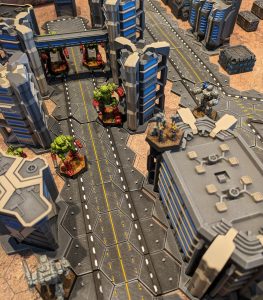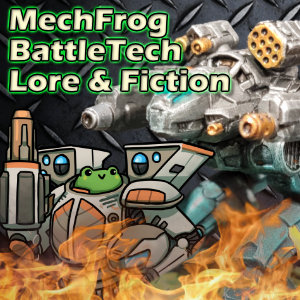Zellbrigen
Sarna News

- HEXTECH Review - Wave 3 Brings More Urban Options To Your Battlefield
- Your BattleTech News Round-Up For March, 2024
- Crashing 'Mechs With Jennifer Brozek, Author Of The Rogue Academy Trilogy
- Getting The Word Out With Rem Alternis, Catalyst Community & Marketing Director
- Bad 'Mechs - Yeoman
- Read more →
Overview[edit]
Zellbrigen is ritualistic form of honor dueling practiced by the Warrior Caste of the Clans.[1][2][3] Many of the tenets of zellbrigen are similar to the provisions of the Ares Conventions, but there are still differences.[4]
History[edit]
The practice of engaging opponents in single combat, the genesis of what would later become zellbrigen, was first started by Clan Coyote during the Operation KLONDIKE.[5][6] Despite the losses incurred by this fighting method, Coyote's Khan Dana Kufahl would continue to encourage her Clan and others to practice this "honorable" form of warfare. Eventually the practice would be taken up by all of the Clans, to a greater or lesser degree, in part as a way to minimize losses in both lives and resources.[1][2] This is especially true when opposing commanders agreed to a duel to determine a battle's outcome. The practice of zellbrigen was formalized by ilKhan Nicholas Kerensky after the death of his brother.[7]
During the Clan Invasion the rules of zellbrigen lapsed, primarily because the Inner Sphere had no concept of Clan cultural norms and, in some cases, exploited them for "underhanded" victories. By the end of the campaign, universal application of zellbrigen had all but died out in several Clans, while most still reserve it for inter-Clan confrontations or against worthy Inner Sphere warriors.[1][2]
Rules[edit]
The rules of zellbrigen consist of the following, which deal with one-on-one combat between 'Mechs. When engaging combat vehicles and conventional infantry these rules do not apply to Clan MechWarriors; likewise Clan infantry and armor units need not follow the rules of zellbrigen when facing other opponents, including 'Mechs. Battle armor and ProtoMechs also follow the rules of zellbrigen although for their purposes a Point constitutes a single unit, e.g. a Point of five Elementals may together duel against an enemy 'Mech.[8]
- Each warrior will issue a challenge to a different enemy. If one side outnumbers the other, then the extra warriors on that side will stand aside until one of their comrades falls in battle. Typically the challenge will be made verbally, for example: "I am MechWarrior Franklin of Clan Smoke Jaguar, piloting the lone Warhawk in Beta Star. I hereby invoke the ritual of zellbrigen and challenge the pilot of the Atlas, adorned with the unit designation number seven, to a duel of warriors. In this solemn matter let no one interfere!"[8]
- A warrior can challenge more than one 'Mech at a time, in which case all of that warrior's opponents are considered part of the same duel and may fire on the lone warrior. While this can be used to deny friendly battle armor, conventional infantry and vehicles the chance to engage in combat, it cannot be used in the same way to deny fellow MechWarriors.[8]
- A warrior has the right to refuse challenges from Inner Sphere units, especially if underhanded ploys are suspected, and has the right to refuse a challenge from a unit of differing weight class if other unengaged units are available.[8]
- Certain actions taken during a duel are considered dezgra and an opponent who engages in them too often can render the fight void. These include intentionally moving out of the line of sight of an opponent, intentionally moving out of weapons range of an opponent, or failing to fire a weapon at the opponent if capable of doing so, although even these may be acceptable if tactically appropriate.[8]
- No artillery or other Area-Effect Weapons shall be employed by either side. Likewise systems that requires multiple units to operate, like C3 and TAG, are forbidden.[8]
A warrior is also expected to not retreat from inferior foes, or to engage his opponent in melee combat, though these are not part of the formal rules of zellbrigen. Also, though it plays a central role in Clans' combat challenges, the ritual of batchall remains a separate tradition.[8] If the rules of zellbrigen are broken the fight will then degenerate into a melee, a free-for-all battle with no restrictions. Such an outcome though is considered a major breach of honor, usually punished by a loss of rank.[9][10]
Aerospace fighter pilots follow a somewhat similar set of rules when engaging in combat, although these really only came about following the Clan Invasion. Ironically for a society which glorified combat, the concept of fighting a space battle was diametrically in opposition not only to Clan military philosophy which decreed only ground troops could take and hold an objective, but also the general bias for watching 'Mechs slug it out. DropShips were essentially seen as noncombatants and only rarely did Clan commanders appreciate that one of the ways to defend a target was by preventing the enemy's forces from landing on the planet in the first place. The Inner Sphere was under no such illusions and very much tried to shoot down Clan DropShips before they could land and their contents disembark. Although the Clans did not lose any DropShips during their invasion, this had more to do with their superior technology than anything else, and resulted in a new set of rules for fighter pilots to follow.[11]
- Once a fighter squadron or DropShip has attacked another enemy squadron or DropShip, no other friendly units may engage them until the original Clan unit has been destroyed. Likewise the original Clan unit cannot engage another unit until they or their enemy has been destroyed.[11]
- During combat a Clan fighter unit will use firepower appropriate to the nature of their opponent. Thus if a Star of ten OmniFighters were to engage a squadron of six Inner Sphere fighters, only six of the Clan fighters would engage while the rest hung back from the fight.[11]
- If a Clan unit was fired upon by another enemy unit they were able to engage them, even if this went against the above rules.[11]
- WarShips were exempt from these rules and could be engaged at will by any Clan fighter or DropShip.[11]
As in ground combat failure to follow the rules would result in a grand melee, with no restrictions involved, but few warriors were willing allow this to happen since (should they survive) they were liable to face anything from a reprimand to an execution. In some instances though the rules did not apply, such as hunting bandits (considered to be unworthy foes) or conducting a Trial of Annihilation.[11]
Interpretation[edit]
How zellbrigen is interpreted depends not only on the individual, but their parent Clan as a whole. At one end of the spectrum, the rules are strictly followed, the only exception being when fighting bandits, pirates or the most hated of enemies. At the opposite end, zellbrigen is figuratively "thrown out the airlock" and used only against other Clan warriors, and even then only when there is an advantage over them. In between are varying levels of adherence; for example, zellbrigen is followed unless circumstances dictated otherwise, such as being outnumbered or thinking one could get away with breaking it.[8]
In the end a warrior's personal honor is subservient to that of his military unit or caste, which in turn is subservient to the honor of their Clan: this can sometimes result in individuals or units using dishonorable tactics "for the greater good."[9][12] Many Inner Sphere observers were shocked for example when the 2nd Falcon Jaegers abandoned zellbrigen in their attempt to capture Victor Steiner-Davion on Alyina. Though rigid traditionalists the Jade Falcons recognized that capturing the heir of the Federated Commonwealth would bring great honor to their Clan, and so the unit's personal pride took second place.[12]
During the Golden Age a Trial of Position would always be fought according to zellbrigen unless the cadets being tested abandoned it.[13]
Prior to the Clan Invasion, Clan Blood Spirit, Clan Coyote, Clan Ghost Bear, Clan Goliath Scorpion, Clan Jade Falcon, Clan Star Adder and Clan Steel Viper adhered strictly to the tenets of zellbrigen. Meanwhile Clan Cloud Cobra, Clan Hell's Horses, Clan Ice Hellion, Clan Nova Cat and Clan Snow Raven were more opportunistic in their interpretation. Only Clan Diamond Shark and Clan Wolf used a liberal interpretation of zellbrigen in their conflicts with the other Clans.[8]
After their defeat at the Battle of Tukayyid, many of the Clans began to rethink their use of these honor rules, and a number of political, military and cultural changes took place. The Blood Spirits, Jade Falcons and Star Adders became more opportunistic, while the Ghost Bears became more liberal, in the use of zellbrigen. The schism within Clan Wolf resulted in its new Crusader-minded leadership to become slightly more conservative, while Clan Wolf-in-Exile maintain a flexible definition of zellbrigen.[8]
Clan Fire Mandrill, by their fractious nature, defy any sort of labeling, with each Kindraa having their own individual understandings of zellbrigen.[8]
References[edit]
- ↑ 1.0 1.1 1.2 Field Manual: Warden Clans, p.17
- ↑ 2.0 2.1 2.2 Field Manual:Crusader Clans, p.15
- ↑ Wolf Clan Sourcebook, p. 126
- ↑ Era Digest: Age of War, p. 16
- ↑ Field Manual: Warden Clans, p. 40
- ↑ Historical: Operation Klondike, p. 65
- ↑ Historical: Operation Klondike, p. 107
- ↑ 8.00 8.01 8.02 8.03 8.04 8.05 8.06 8.07 8.08 8.09 8.10 Total Warfare, p. 273-275
- ↑ 9.0 9.1 MechWarrior's Guide to the Clans, p. 89
- ↑ Field Manual: Warden Clans, p. 169-170
- ↑ 11.0 11.1 11.2 11.3 11.4 11.5 BattleSpace, p. 9-10
- ↑ 12.0 12.1 The Clans: Warriors of Kerensky, p. 42
- ↑ Era Digest: Golden Century, p. 15

